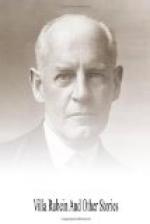“I can’t do it,” he said, “I feel such a hypocrite; I can’t put myself into leading-strings again. Why should I ask these people, when I’ve settled everything already? If it were a vital matter they wouldn’t want to hear—they’d simply wire, ‘Manage this somehow!’”
Scorrier said nothing, but thought privately ‘This is a mad business!’ What was a letter? Why make a fuss about a letter? The approach of mail-day seemed like a nightmare to the superintendent; he became feverishly nervous like a man under a spell; and, when the mail had gone, behaved like a respited criminal. And this had been going on two years! Ever since that explosion. Why, it was monomania!
One day, a month after Hemmings’ departure, Pippin rose early from dinner; his face was flushed, he had been drinking wine. “I won’t be beaten this time,” he said, as he passed Scorrier. The latter could hear him writing in the next room, and looked in presently to say that he was going for a walk. Pippin gave him a kindly nod.
It was a cool, still evening: innumerable stars swarmed in clusters over the forests, forming bright hieroglyphics in the middle heavens, showering over the dark harbour into the sea. Scorrier walked slowly. A weight seemed lifted from his mind, so entangled had he become in that uncanny silence. At last Pippin had broken through the spell. To get that, letter sent would be the laying of a phantom, the rehabilitation of commonsense. Now that this silence was in the throes of being broken, he felt curiously tender towards Pippin, without the hero-worship of old days, but with a queer protective feeling. After all, he was different from other men. In spite of his feverish, tenacious energy, in spite of his ironic humour, there was something of the woman in him! And as for this silence, this horror of control—all geniuses had “bees in their bonnets,” and Pippin was a genius in his way!
He looked back at the town. Brilliantly lighted it had a thriving air-difficult to believe of the place he remembered ten years back; the sounds of drinking, gambling, laughter, and dancing floated to his ears. ‘Quite a city!’ he thought.
With this queer elation on him he walked slowly back along the street, forgetting that he was simply an oldish mining expert, with a look of shabbiness, such as clings to men who are always travelling, as if their “nap” were for ever being rubbed off. And he thought of Pippin, creator of this glory.
He had passed the boundaries of the town, and had entered the forest. A feeling of discouragement instantly beset him. The scents and silence, after the festive cries and odours of the town, were undefinably oppressive. Notwithstanding, he walked a long time, saying to himself that he would give the letter every chance. At last, when he thought that Pippin must have finished, he went back to the house.
Pippin had finished. His forehead rested on the table, his arms hung at his sides; he was stone-dead! His face wore a smile, and by his side lay an empty laudanum bottle.




